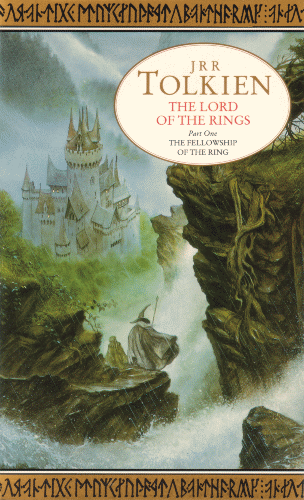Since I always start my Lord of the Rings re-reads with the Foreword and the Prologue, I’ll start the discussion with these sections as well. (For more about this project, see the introductory post.)
Foreword
This is the Foreword to the second edition (1966)*, which has the notes on the history of the book’s writing, and the famous comments on allegory. It’s only on this re-read that the WWI comments have snagged my attention, as I thought about history and loss with regard to the story and the author: “By 1918 all but one of my close friends were dead.” Perhaps it’s because that sentence is buried in the middle of a long paragraph, or because of my extreme youth when I first read it, but only now does that sentence haunt me.
Perhaps, also, I was distracted by the WWII comments, which always made me think I didn’t know nearly enough about the history of that war:
The real war does not resemble the legendary war in its process or its conclusion. If it had inspired or directed the development of the legend, then certainly the Ring would have been seized and used against Sauron; he would not have been annihilated but enslaved, and Barad-dur would not have been destroyed but occupied. Saruman, failing to get possession of the Ring, would in the confusion and treacheries of the time have found in Mordor the missing links in his own researches into Ring-lore, and before long he would have made a Great Ring of his own with which to challenge the self-styled Ruler of Middle-earth. In that conflict both sides would have held hobbits in hatred and contempt: they would not long have survived even as slaves.
Having thought about it since, it’s hard for me not to read this as referring to the atomic bomb at least in part, and at least a few other people concurred when I initially posted about this section. Jo Walton, in comments also posted at her journal, also referred to social changes in the UK and the feared behavior of the UK’s allies.
Finally, I don’t think I noticed until recently that Tolkien gets a little cranky, not only about allegory, but at critics:
Some who have read the book, or at any rate have reviewed it, have found it boring, absurd, or contemptible; and I have no cause to complain, since I have similar opinions of their works, or of the kinds of writing that they evidently prefer.
I’m inclined to think that even Tolkien shouldn’t respond to reviews, though if I’m only noticing this now perhaps it’s not so bad.
Prologue
This is in a historian’s voice, which is very like the voice of the Foreword to my ear. The framing device is of a historical story, of our world, with Tolkien as translator.
This now looks very odd to me in light of Tom Shippey’s Road to Middle-earth, which discusses Tolkien’s goal of calquing (translating) England into Middle-earth: so much of the information here seems to be aimed at that goal but is completely unnecessary to the new reader, who I think at most needs the brief summary of The Hobbit—at most, since I suspect the discussion in “The Shadow of the Past” would be sufficient, or could have been made to be. Everything else could go in the Appendices.
More, I think it should: if I were reading this for the first time today, the Prologue would not be an incentive to keep reading. It’s a lengthy infodump, much of which has no obvious immediate relevance to the story ahead and as a result hardly grabs my attention. Yes, it has some foreshadowing of danger to come, with its comments about how hobbits are sheltered but don’t know it any more, but it’s a novel, there ought to be peril and conflict. And when an omniscient narrator tells me twice in one sentence that it’s “astonishing” that hobbits smoked—and then devotes an entire section to the fact!—I would probably start wondering if our priorities and worldviews were sufficiently similar to get along for a long book.
(Also, the discussion of textual sources gives away that all four hobbits live through the War of the Ring. I might not recognize the significance of this on a first read, but is it really a good idea to spoil your own work?)
As a general matter, I don’t particularly mind a faux-historian framing device. But the conceit that Middle-earth is an earlier stage of our world has never really grabbed me, and I’m not sure why. (I know other people feel differently; some of them weighed in over on a prior LJ post.) Today, I also find the implication that the translator has spoken to hobbits a little twee.
The last things I want to note about the Prologue is that it is already establishing several things that will prove significant in the story proper: the image of towers on a hill overlooking the Sea; calling Bilbo’s finding of the Ring an “accident” in scare quotes; and the theme of magic and the non-human dwindling and fading into the past.
Next up, chapter one.
* The first edition had an entirely different Foreword, which I have not read but which is reprinted in The Peoples of Middle-earth; apparently it continues the framing device of Tolkien-as-translator that is retained in the Prologue and Appendices. (Thanks to David Bratman for sharing his paper “The Artistry of Omissions and Revisions in The Lord of the Rings” with me.)










